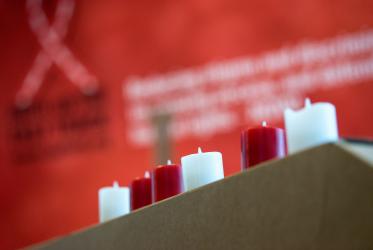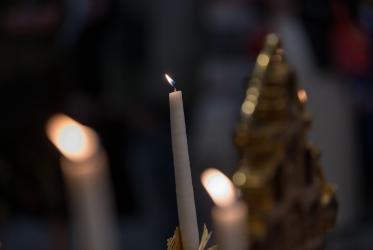The World Council of Churches Ecumenical HIV and AIDS Initiatives and Advocacy, in collaboration with Christian Council of Nigeria (CCN), UNAIDS Nigeria, Federal Ministry of Health in Nigeria, and National Agency for the Control of AIDS in Nigeria convened an interfaith consultation on positive masculinities and femininities with adolescents and young people at the Nera Hotel Ltd, in Abuja, Nigeria from 22-25 May. The gathering brought together more than fifty religious leaders, theologians, people living with HIV, adolescents and young people, teachers, health professionals, media persons and government officials for frank conversation.
Below are brief interviews with a few participants.
Rev. Dr Benebo Fubara-Manuel, president of the CCN
Q: What was the main message of your presentation as keynote speaker?
Fubara-Manuel: In my message I try to highlight the intersection between masculinity and femininity with the very problematic issues of gender, disability and poverty. The presentation reminded the public of the need to discuss the issues of masculinity and femininity in relationship to disability.
I called on religious communities to re-read the scriptures in such a way to produce a healthy relationship; we have in all our scriptures texts of terror that play women down and make the man everything. These texts were useful when they were written but now they need to be re-read so that the truth will come out clearly.
Q: How do you think the forum would push towards ending AIDS as a public health challenge in Nigeria?
Fubara-Manuel: HIV is spread in our context because of the false masculinity: a man thinks that to be a man he must has multiple partners, while a woman will push through poverty to survive through prostitution. If there is positive masculinity and positive femininity it will drastically reduce the prevalence of HIV and AIDS.
Q: You spoke of the need for religious communities to highlight the plight of people with disability; can you elaborate more on that?
Fubara-Manuel: People who live with disabilities in Nigeria are the ones who suffer most; they are not remembered by government policies at all levels of governance, and they are made objects of charity. In my presentation, I appealed to the government at all levels to make people living with disabilities a priority because they are the ones who suffer most.
Q: Religion and culture give more power to men than women, and feminism is downplayed in our society; what do you think should be done?
Fubara-Manuel: I think all over the world patriarchy is dominating; men dominate and men control the power, but patriarchy itself is not a divine institution. Patriarchy is our human frailty and human sin. The world in which we are living today has shown us that men and women are equal before God. It is therefore the duty of religious communities to re-read religious scriptures so that the very intention of God will be understood, and God’s intention is for a society where there is equality between man and woman. Anything that Islamic and Christian scriptures teach us that places a man above woman is only a contextual instruction for a time.
Hajiya Halima Jibril, national president, Federation of Muslim Women Associations of Nigeria (FOMWAN)
Q: What kinds of opportunities did this meeting give participants?
Jibril: The meeting gives an opportunity to reexamine our role as religious leaders. As religious leaders, have we played our role to encourage the youth to adhere to religious practice? The youth, because of religion, will have a stronger conviction that they must account for their actions before God.
Q: Can you describe some aspects of FOMWAN’s programmes?
Jibril: FOMWAN has a health committee that is focusing on HIV prevention and is also designing a new programme to address stigmatizing people living with HIV. Stigma forces so many people to deny having HIV; therefore FOMWAN is working with women in Islamic schools in northern states to educate them on sexual and reproductive health including HIV and AIDS.
Isah Mohammed, national coordinator, Association of Positive Youths Living with HIV/AIDS in Nigeria (APYIN)
Q: What opportunities did this forum provide for young people?
Mohammed: We are bridging the gap between the adults and adolescents and young people. For us as young people, the meeting provides an opportunity for our voices to be heard and to mainstream our opinions into the discussion. Adults need to understand what it means to be young, what our vulnerabilities are, what the gender issues are, and the impacts these issues have on the situations we are facing concerning HIV and AIDS.
The association welcomes this initiative; we think even though it is long overdue it is better late than never. It is important to us at APYIN that religious leaders have realized the need to hear our voice, let us talk, and have a balanced discussion between our needs and their expectations.
We also need to see meaningful commitment from our government at all levels, because as it is, interventions at states and local governments are not visible in many states of the country.
Q: How do you think this meeting will push towards reducing stigma and discrimination against people living HIV?
Stigma took a long time to grow and it will also take some time and creative effort to bring it down. This meeting as one activity may not bring stigma down to the level we want. But it is a beginning of the conversation.








